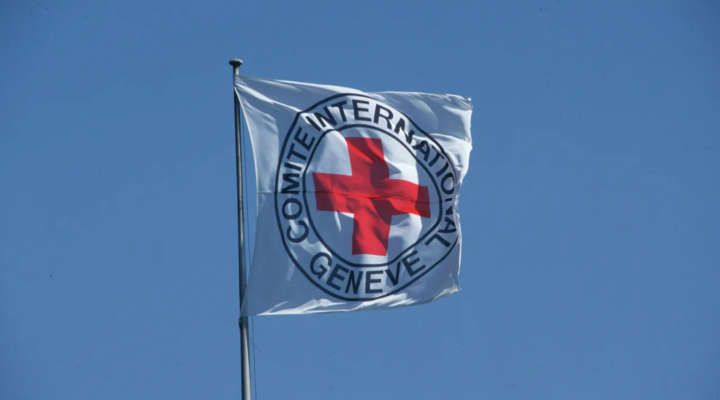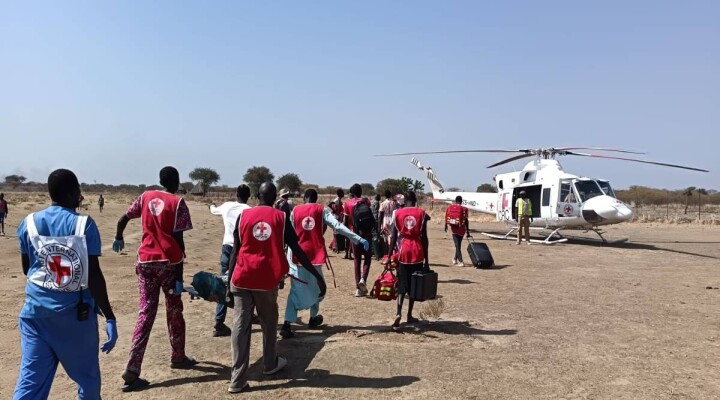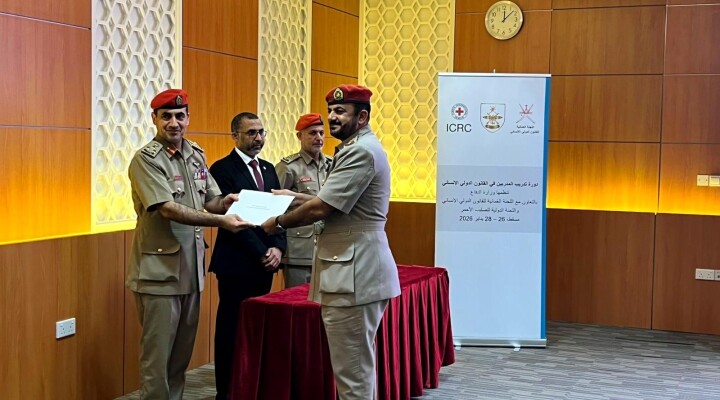Ukraine: Bolstering Support for People with Disability in Kharkiv
The International Committee of the Red Cross (ICRC) has launched a partnership with Kharkiv University Clinic and Ukraine’s Ministry of Health to provide physical rehabilitation support for the growing number of people in need due to amputations and disability caused by the armed conflict.
“People who need prosthetic limbs living near the front-line need, want and can continue to be active members of society,” said Stefanie Gartlacher, head of the ICRC team in Kharkiv.
“This expanded program will help them do that”.
Patients and staff from the clinic as well as representatives from the ICRC and other local authorities attended the soft launch of the new program in mid-September. A new rehabilitation wing is being built at the Kharkiv University Clinic, including a prosthetic and orthotic laboratory, to provide comprehensive support for people living with disability.
The new wing will provide a permanent space for the service a mobile clinic run by the ICRC has been providing at the site since July. The clinic consists of four containers that can be transported by trucks, but which still provide a full range of physical rehabilitation services, from the creation of prosthetics to physiotherapy.
Once the new wing at Kharkiv University Clinic is complete, the mobile clinic will move to another location in Ukraine to help patients there.
The partnership aims to improve overall health outcomes for patients requiring physical rehabilitation services, promoting social well-being, self-reliance and full participation in daily life.
It seeks to ensure patients will have access to mobility devices, temporary prosthetic and orthotic services combined with physical therapy and related rehabilitation treatment – including mental health support.
The program will start with a priority focus on people who have had lower limb amputations and is open to anyone directly or indirectly affected by the armed conflict.
“We want to acknowledge the physical, mental and social cost of armed conflict on every patient,” said Oscar Bermudez, the ICRC physical rehabilitation team leader in Kharkiv.
“We do this work because physical rehabilitation can be the key towards patients regaining the capacity to participate fully in society,” he said.
For further information or interview requests, please contact:
- Pat Griffiths, ICRC Spokesperson in Ukraine (English), pgriffiths@icrc.org, +380 66 657 02 89
- Oleksandr Vlasenko, ICRC Spokesperson in Ukraine (Ukrainian), ovlasenko@icrc.org, +380 95 262 80 23
- Available for interview: Oscar Bermudez, ICRC Physical Rehabilitation Program Team Leader in Kharkiv
SHOTLIST
Length: 05:12
Location: Ukraine, Kharkiv
Date Of Filming: 13.09.2024
Camera: Tetiana Oliinyk
Producer: Francisco Pavon/Tetiana Oliinyk
Editor: Tetiana Oliinyk
Copyright: ICRC access all
On Screen Credit: ICRC written or logo
|
00:00-00:04 |
Shots of the Prosthetic and Orthotics Laboratory (P&O Lab) of the ICRC and Kharkiv University Clinic. |
|
00:04-00:31 |
Rayner Erasmus, ICRC ortho-prosthetist, works on making a prosthesis for a patient of Kharkiv University Clinic. |
|
00:32-00:51 |
Rayner Erasmus, ICRC ortho-prosthetist is fitting a prosthesis to Oleksandr Mikashutin, a serviceman who stepped on a mine. |
|
00:51-01:01 |
Oleksandr Mikashutin is training to walk on a prosthetic leg. |
|
01:01-01:18 |
Oleksandr Mikashutin speaks to the camera: Once I have the prosthesis, I have a tractor and will try to drive it. » |
|
01:18-01:24 |
Shots of Oleksandr Mikashutin training to walk on a prosthetic leg. |
|
01:25-01:29 |
Mykhailo Prylutskyi, a patient of the clinic who lost a limb due to thrombosis, arrived for a fitting of a prosthesis. |
|
01:30-01:52 |
The process of fitting a temporary prosthesis for Mykhailo Prylutskyi. |
|
01:52-02:26 |
Mykhailo Prylutskyi speaks to the camera:
«I have very high hopes that I will be free to go wherever I want, to go for a walk in the yard at home, to walk the dog. I've been waiting for it [the prosthesis] since I was in hospitals, not even in one, but in three hospitals. So I had hopes that I would be a full-fledged person.» |
|
02:28-03:01 |
Juliette Senet, an ICRC physiotherapist, provides a physical therapy session to Mykhailo Prylutskyi, a patient of the clinic. |
|
03:02-03:40 |
Mykhailo Ivanov, who lost his limb in military service speaks to the camera: I was sent here from the military unit. They searched and searched, but there was no place, I stayed there for a week, and then there was a place at the University Clinic, and I was sent here. I want to walk, run, try to continue to live, work and have a family.» |
|
03:41-03:53 |
Mykhailo Ivanov leaves the mobile laboratory after casting his prosthesis. |
|
03:54-03:56 |
Rayner Erasmus, ICRC Ortho-Prosthetist in Kharkiv enters the mobile laboratory. |
|
03:56-04:55 |
Rayner Erasmus, ICRC Ortho-Prosthetist in Kharkiv speaks to the camera: |
|
04:56-05:12 |
Footage of Prosthetic and Orthotics Laboratory (P&O Lab) of the ICRC and Kharkiv University Clinic. |
Established in 1863, the ICRC operates worldwide helping people affected by conflict and armed violence and promoting the laws that protect victims of war. A neutral, independent and impartial organization, its mandate stems from the Geneva Conventions of 1949.



